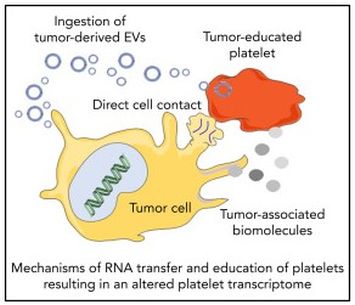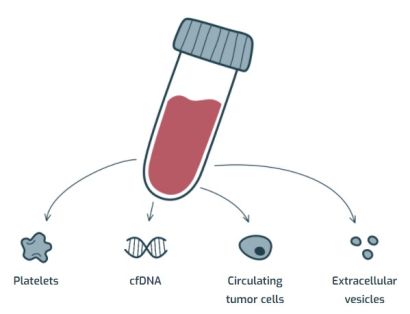IPlatelets and tumor cells interactions are a well-known phenomenon that was already identified in the nineteenth century. A large number of studies have investigated the mechanisms involved on this association. Tumor cells recruit platelets to support cancer progression. Due to their highly dynamic membrane, platelets sequester and/or release several molecules that promote tumor growth, angiogenesis and metastasis. This exchange of signals can occur through direct contact with the cells by membrane proteins or through extracellular molecules release by the cells. Tumor cells may exploit these mechanisms to ‘educate’ platelets, which could result in alteration of the platelet RNA content. Altered transcriptome of platelets may provide a unique biomarker source for liquid biopsy tests. Liquid biopsies offer a minimally invasive and safe alternative or complimentary approach to tissue biopsies. Liquid biopsies enable not only the detection of tumors but can also be relevant for prognosis, personalized treatment, monitoring of the therapy and prediction of recurrences. Further studies of RNA transfer mechanisms between platelets and cancer cells may help us to identify new potential targets for cancer treatment. Moreover, large prospective studies are needed to validate the diagnostic power of individual platelets TEP markers or their RNA signature for potential future clinical implementation.
Download the article in Blood

This study is part of the European Liquid Biopsy Academy (ELBA) project.
ELBA is a MSCA ITN funded project that aims to educated 15 Early-Stage Researches (ESRs) with in-depth knowledge of diagnostic applications of liquid biopsies.
Liquid biopsies have been heralded as a game changer in cancer management, with blood tests offering a minimally invasive, safe, and sensitive alternative or complimentary approach for tissue biopsies. Blood of cancer patients is a rich source cancer-related biomarkers that can be identified though the analysis of different biosource such as tumor educated platelets (TEPs), circulating tumor cells (CTCs), cell-free circulating tumor DNA (cfDNA) and extracellular vesicles (EVs).
This large integrated project cover the development and implementation of innovative diagnostics, including assay development, bioinformatics, clinical validation, standardization and comparison of different blood-biosources and technologies.
For this purpose, nine different European institutes and several companies have come together to create an international network able to address the challenges of the development of new effective liquid biopsy blood-testes for cancer detection.


